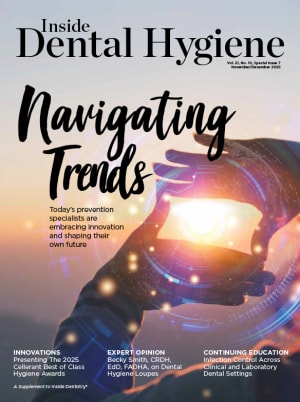Supporting Patients with Postpartum Depression
After becoming a mother myself and routinely seeing new mothers in my dental chair, I began to reflect more deeply on the role dental professionals can play in postpartum care. The American College of Obstetricians and Gynecologists recommends just one, possibly two, follow-up visits with a physician within 12 weeks after childbirth. In contrast, dental professionals often see postpartum patients at least twice in the first year after delivery—and more frequently if periodontal therapy or restorative treatment is needed.
This consistent and ongoing contact positions dental professionals uniquely to observe, support, and refer patients who may be struggling with postpartum depression (PPD), a condition that often goes undetected after the standard six-week obstetric visit.
I speak from personal experience. I silently suffered from postpartum depression for two years after the birth of my last child. Despite attending regular dental and medical appointments, mental health was rarely addressed beyond that initial postpartum check-in. In hindsight, I recognize how significantly my mental health impacted my daily functioning and relationships. I often wonder: what if someone during a dental visit had asked about my well-being or recognized the signs? Could my journey have looked different?
That experience, coupled with my clinical encounters with new mothers, has reinforced the belief that dental professionals can—and should—advocate for the mental and overall health of postpartum patients.
What Is Postpartum Depression?
Postpartum depression is a serious mental health condition that affects approximately 1 in 8 mothers within the first year after giving birth. Its impact extends beyond emotional health, influencing physical and behavioral patterns—including oral health habits.
Oral Health Implications of Postpartum Depression
Neglect of Oral Hygiene
A hallmark symptom of depression is reduced motivation, which often extends to personal care routines. This can result in poor oral hygiene, increased plaque accumulation, and higher risk for both caries and periodontal disease. As dental professionals, we have the benefit of baseline periodontal measurements and clinical notes from previous visits to identify changes that may indicate declining self-care.
Dry Mouth (Xerostomia)
Many antidepressants prescribed to manage PPD list xerostomia as a side effect. Decreased salivary flow compromises the mouth’s natural defenses, increasing susceptibility to decay, mucosal irritation, and infection.
Bruxism (Teeth Grinding)
Anxiety and stress associated with PPD can manifest as bruxism, which may lead to tooth wear, sensitivity, muscle fatigue, and temporomandibular discomfort.
Dietary Changes
Mental health challenges often correlate with shifts in dietary patterns. These changes can raise caries risk and should prompt hygienists to reassess caries risk levels and compare them to previous evaluations.
How Dental Hygienists Can Support Postpartum Patients
Dental hygienists are on the front lines of preventive care and are well-positioned to detect early signs of PPD and provide supportive resources. Here are some of the ways hygienists can assist patients who may be experiencing PPD:
Screening and Communication
• Clinical awareness: Look for indicators like biofilm accumulation, gingival inflammation, or general changes in hygiene habits.
• Compassionate communication: Foster a supportive and private environment. Sit the patient upright when discussing sensitive topics, use a calm tone (especially in open-bay offices), and prioritize connection with this vulnerable patient group.
Education and Empowerment
• Home care modifications: Recommend tools such as electric toothbrushes or interdental brushes to make daily care more manageable. If they are experiencing dry mouth, supplement their saliva with toothpaste that contains calcium and phosphate for extra minerals, or salivary substitute to hydrate during the day.
• Nutritional counseling: Discuss how shifts in eating patterns—due to lack of energy, emotional eating, or nutritional gaps—can influence oral health.
Referrals and Resources
• Interdisciplinary referrals: If PPD is suspected, encourage follow-up with a mental health professional. Maintain a list of trusted local providers for convenient referral.
• Resource sharing: Provide handouts or links to nearby support groups, local health departments, or online communities focused on maternal mental health. You as a professional can join these groups to learn more and find resources to help guide patients to.
A Call for Dental Professionals
Dental professionals play a critical role in the broader healthcare system. Many times, like after a patient gives birth, we are considered a “health home” as we connect, treat, and provide health recommendations more than a medical doctor does. By recognizing the oral health manifestations of postpartum depression and offering compassionate, informed care, we can help bridge a vital gap in support for new mothers.
As a mother, I would have deeply appreciated someone simply asking how I was doing. As a dental professional, I now see it as part of my responsibility to do just that. New mothers need our support—and we have the privilege of being a consistent, trusted touchpoint during this vulnerable time.
Melia Lewis, MEd, BSDH, RDH, FADHA, practices at Aspen Heights Dental in Highland, Utah, and is an adjunct professor at Colorado Northwestern Community College. She is cofounder of Hygiene
Edge (www.hygieneedge.com), an online education platform, and owns and operates Acuti Sharpening (www.acutisharpening.com), a dental hygiene instrument sharpening company. She can be contacted at melia@hygieneedge.com or on Instagram at @hygieneedge and @meliardh.
